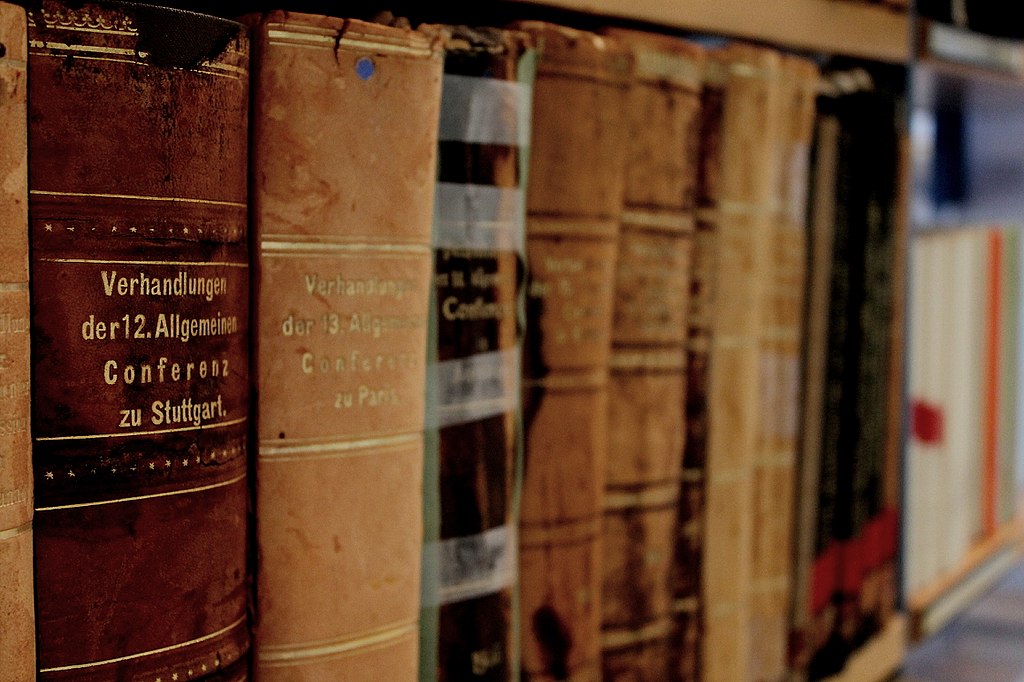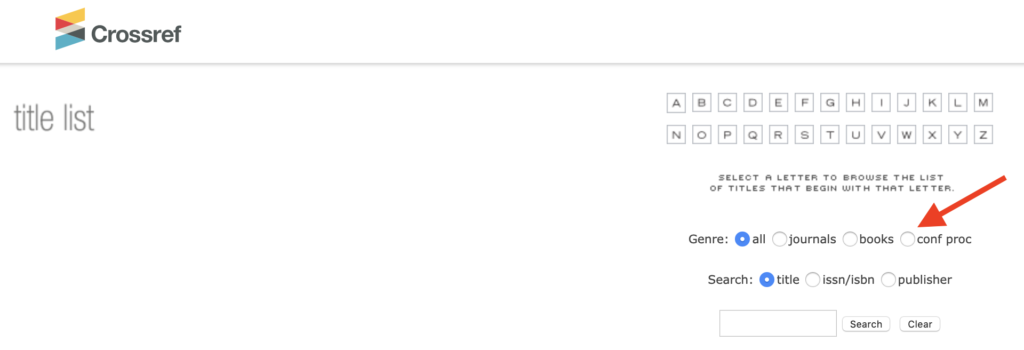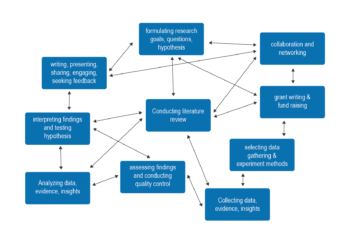Editor’s Note: Aliaksandr (Alex) Birukou is an Editorial Director at Springer Nature. His team in Computer Science (CS) Editorial publishes the conference proceedings in CS (~850 volumes/year, including the Lecture Notes in Computer Science, LNCS, series). Alex’s other team runs the portfolio of roughly 200 journals in different disciplines, translated from Russian into English. Apart from editorial work Alex represents editorial in several internal and external R&D projects dealing with optimization or innovation of scientific publishing.
This blog post is inspired by many questions from colleagues about what exactly conference proceedings are, and why they are so important in some disciplines. Although this is not a comprehensive overview (*the “everything” of the title is a little ambitious!), I will try to explain the critical role that conference proceedings play specifically in computer science, and I invite other colleagues to share information about how proceedings work in their disciplines, either in the comments or as a separate blog post.

So, what are conference proceedings?
Proceedings are not a book of abstracts. Papers in conference proceedings contain original/primary research results, published as full or short papers. These papers are peer reviewed by the conference program committee, normally using single- or double-blind peer review. Some communities are experimenting with open or transparent peer review, but to date the uptake has been slow.
They differ from monographs or textbooks, where proposals for the entire book are reviewed rather than individual chapters. And they differ from journals because the review process has clear deadlines for submission, notification to the authors (which is final, i.e., there are no revisions), and submission of the camera-ready paper.
This is because most of the conferences prefer to have their proceedings published before the conference, to guarantee a timely record of the research presented. Some conferences like to carry out an additional round of reviewing after the event, or to give authors the opportunity to update their papers with the insights they have gleaned from the meeting. In these cases, the proceedings are published after the event.
In Springer Nature’s computer science editorial group, we select conferences for publication using the editorial boards of or via trusted partner societies. We look at the topics, people involved, past history, and the peer review process.
Are proceedings books or journals?
This is the most frequently asked question. Those of you familiar with the German language know that it has three genders: feminine, masculine, and neutral. The books/journals dichotomy is like asking, “Do you think neutral is more feminine or masculine?“
Crossref lists proceedings as a separate genre , as do IEEE and ACM, both of whom publish a large number of proceedings.

However, for historical reasons, some publishers and some disciplines publish conference proceedings in journals (BMC Proceedings, Elsevier Procedia CS), while others (IOS Press), publish them as books. Springer happily contributes to the confusion, as the Lecture Notes in Computer Science (LNCS) series started as a book series in 1973, well before Crossref was created and we have never adjusted since.
Summa summarum, conference proceedings are not journals or books, but for historical reasons some are published as one or the other of these:.
- (similar to journals) Papers in conference proceedings contain original/primary research results, and therefore enjoy pre-print and copyright policies aligned with journals.
- (similar to journals) This also means that the research integrity should be checked (is there plagiarism or peer review manipulation?).
- (similar to journals) Conferences take place regularly (often annually) and continue publishing proceedings, which makes them a periodical. For instance, see the example of the International Workshop on Graph-Theoretic Concepts in Computer Science, which has been publishing with Springer since 1980, and, 1975-79, was published by Hanser.
- (similar to books) Proceedings published with Springer Nature are also available as EPUB, as well as PDF/HTML.
- (similar to books) Proceedings are available on Amazon, Google Books, etc.
In which disciplines do researchers publish in conference proceedings?
Let us look at the numbers from Scopus (11 October 2019), which I chose for two reasons. First, it does a great job of indexing conference papers, even if they appear in journals or books; second, the coverage of conference proceedings in the Web of Science is less predictable, with fewer proceedings covered.
- Engineering: 5,062,696 documents
- Computer Science: 3,375,491
- Physics and Astronomy: 1,518,203
- Mathematics: 1,228,209
- Materials Science: 1,167,538
- Medicine: 657,272
- Energy: 532,052
- Earth and Planetary Sciences: 452,405
- Environmental Science: 391,478
- Social Sciences: 363,848
Note that Scopus assigns the same paper to several categories, so most computer science papers appear in the engineering or mathematics categories as well.
And, using SpringerLink to compare how this overall picture compares with the distribution of topics at Springer, we see:
- Computer Science: 507,337
- Engineering: 189,485
- Medicine & Public Health: 114,817
- Physics: 85,027
- Mathematics: 48,403
- Business and Management: 30,936
- Life Sciences: 28,519
- Earth Sciences: 18,859
- Chemistry: 18,487
- Biomedicine: 17,630
- Materials Science: 11,886
As you can see, Springer has less engineering content and the share of medicine is higher than in Scopus. Still, the top areas in both databases are computer science, engineering, physics, and mathematics.
Why are proceedings so important in computer science?
Authors of primary research in computer science often favor conference proceedings over journals because the format helps them get their work out to the global community faster. In fact, conferences are pivotal to the entire research lifecycle in this field, with the commissioning process, ongoing exchange of ideas, and publishing schedules closely tied to large international events. When we analyzed primary research in computer science in Scopus for 2012-2016 we found that 63% of original research results are published in conference proceedings, with only 37% published in journals.
In a viewpoint published in Communications of ACM, Lance Fortnow explains that computer science emerged in the 1950s as a new field. It was easier to start from scratch in terms of how research was communicated, and the conference system therefore developed as a vehicle for the rapid dissemination of research papers through conference proceedings, fast reviews, and community get-togethers. It was natural that publishers and societies then started publishing the resulting conference proceedings, and that these are recognized as valuable contributions to the field. In 2013, for example, the ACM Distinguished Service Award was given to Gerhard Goos, Juris Hartmanis, and Jan van Leeuwen, the founding editors of the Lecture Notes in Computer Science (LNCS) series.
Conference proceedings play a key role in the dissemination of research results in computer science and electrical engineering. Serving on program committees, reviewing papers, and publishing in proceedings has significant benefits for one’s career as a scientist. In recognition of this, and in order to better track conferences and related scientific activities, in 2018, Crossref and DataCite launched a Working Group on Persistent Conference IDs and CrossMark for proceedings. Stay tuned for more updates on this vibrant field!
Now it’s your turn! What role do proceedings play in your discipline / publishing program? Are they published as books, journals or proceedings? Could you please share your experience in the comments?
Disclaimer: opinions expressed are my own and do not necessarily reflect that of my employer Springer Nature
Discussion
12 Thoughts on "Guest Post — Everything* You Ever Wanted to Know about Conference Proceedings But Were Afraid to Ask"
Thank you for this. It reminds me of the distinction between research and review journals, which has a fuzzy boundary.
My own recent experience is in oncology, publishing books which are designed to assist clinicians in their work. Not research. But I perceive that research is published in both journals and conference proceedings by the same people. The opportunity to share results of trials swiftly makes conference presentation attractive and therefore proceedings important. Papers in journals are more considered and discursive, as befits review journals. It would be interesting to hear how people decide as authors to present their work, as well as what we publishers intend them to do!
Duncan, thank you for your comment. Indeed, speaking of computer science, the authors in conferences and journals are the same. They would often submit to the conference, and then would extend the proceedings paper with more experiments and details and publish a journal paper.
Also, at CS conferences the content is peer reviewed and such peer review process is rather competitive. Normally, at least 3 reviewers look at one’s paper and many conferences have 20-30-40% acceptance rate.
Thanks for raising this important topic.
In fact, we have a HUGE problem with conference papers, including those published by Springer and other major firms. It’s rooted in crude evaluation schemes, which fuel the demand for WoS and Scopus publication counts. Nowadays conferences have almost superceded predatory\weak journals as means of getting those precious wos\scopus publication counts, especially on the university level.
Currently the vast majority of Russian conference papers in WoS\Scopus are either proceedings of conferences organized in Russia with almost no international participation, or (especially in the case of SSH) predatory conferences with “virtual presentations”. The first route is enabled by for-profit publishers which agree to publish essentially anything and do not check the quality of peer review. For example, in 2018 Moscow Intitute of Civil Engineering has organized a conference, published it via IOP and almost instantly got 224 WoS-indexed papers by its faculty. In the same year this organization has published only 41 WoS-indexed journal articles (not counting ESCI limbo).
Overall the total number of WoS-indexed proceedings papers with Russian affiliations grew from 4087 in 2011 to 21148 in 2017, or from 1,3% of the World totals to 5%. And in Social sciences and humanities it grew from 1% to 8%, and preliminary data for 2019 is staggering 13% of the World totals. Just go to WoS\Scopus and see for yourself.
This is a very serious issue and should be dealt with immediately, mainly by the majors who argee to publish local proceedings without proper checks, and by officials introducing bad metrics. WoS\Scopus can’t evaluate the quality of hundreds of individual conferences published by these major presses, so their only options are to delist the whole volumes. Elsevier has blacklisted EDP Sciences’ conference proceedinds becaus of these quality issues and could proceed with delisting volumes by Springer, IOP etc. They even delisted a bunch of their own Procedia series, but this crude solution harms the legitimate and reputable conferences.
And of course not only Russia is affected. For example, in 2009-2019 Wuhan university of technology has published 2500+ conference papers in WoS CPCI-SSH , while the whole University of California system has published only 1788. And Bucharest University of Economic Studies has published 3962. By the way, the latter Romanian case is well-known to Clarivate and they’ve tried to do something about it but evidently failed.
Proceedings papers quality and indexing needs to be urgently discussed by the triad of publishers, database providers and indicator designers with the help of general academic community before it becomes too big.
Ivan, I cannot attach a picture, but here is the link to the screenshot shared via Dropbox: https://www.dropbox.com/s/gybbe3kzg66tybh/Scopus2018RussiaVsWorld.png?dl=0.
Those are 12 top areas in Scopus for 2018 for Russia (incidentally, they are the same top areas in the world) and the proceedings/journals share in each discipline. They do not sum up to 100% for discipline because there are also books, trade papers, etc. indexed by Scopus. Computer science in Russia: 67% of proceedings vs. 51% worldwide. Engineering: 53% vs 34%; Mathematics: 41% vs. 31%. Materials Science (43% vs 22%), Chemistry (18% vs 4%), Environmental Science (33% vs 11%), Agricultural and Biological Sciences (11% vs 2%) in Russia have much bigger share in proceedings than worldwide share. It might be interesting looking into the reasons behind this and how it changes with different incentives structure Russian Government now adopts for the RAS institutions.
Ivan, thank you for the comment. You are raising the important problem of fake/predatory conferences and Russian scientists (potentially) using fake conferences to game the system. You might find the discussion we had at Science Online 2019 interesting: https://elibrary.ru/projects/conference/majorca2019/program.asp – scroll to “Дискуссия: “Проблемы развития научных конференций как важнейшего средства коммуникации в современной науке” for presentations. The basic takeaway was – the indexing services (WoS, Scopus, Dimensions) are aware of the problem and are removing predatory conference aggregators. I think it is important to separate the disciplines with proceedings culture to which I refer to the post and where the growth of conference papers by Russian authors (e.g., we face it in Computer Science) just means their integration in the international community. In particular, if you have an example of a dubious Russian conference in Springer, please do let me know.
How do you manage ethical issues in conference proceedings? For example, authorship disputes or plagiarism allegations?
A good point, making sure appropriate ethics and consent has been given and published would be another one, as would detail on how the peer review is generally checked would also be interesting to know. I certainly don’t dispute the value of conference proceedings, however, how are papers audited if it is being completed by the external conference team?
Authorship, plagiarism/duplicate publication/copyright, competing interests, peer review etc would normally be part of a central system, if in a journal, so knowing the process differences would be very interesting.
This is a very good question. Currently, for the conferences we publish in Springer Nature, the ethical policy, peer review, criteria for accepting/rejecting a paper are decided by the conference. Normally, it means there is a steering committee or another similar body making decisions which apply to each conference in the series. E.g., there would be TACAS steering committee: https://tacas.info/committee.php, responsible for organizing TACAS 2019, TACAS 2020, and so on.
So, it is similar to a journal EB/EiC deciding on how the journal conducts peer review and deals with the plagiarism and other publication ethics issues.
From the publisher side, we would require that such policies meet our general editorial policies: https://www.springer.com/gp/authors-editors/journal-author/journal-author-helpdesk/editorial-policies/14214.
As for peer review, in the Crossref/Datacite group on PIDs for Conferences and Projects https://www.crossref.org/working-groups/conferences-projects/ one of the workstreams is dealing with the transparent definition of the peer review process. Such metadata about the peer review contains information about whether it was single- or double- blind, how many papers have been submitted, how many reviews each paper got, etc. You can see an example for a TACAS 2019 paper at https://crossmark.crossref.org/dialog/?doi=10.1007%2F978-3-030-17462-0_4 – in Crossmark, under “Other information”, which is linked from the paper at https://link.springer.com/chapter/10.1007/978-3-030-17462-0_4#aboutcontent. A write-up of the initial results is available at https://www.springernature.com/de/researchers/the-source/blog/blogposts-for-peer-reviewers/transparency-in-peer-review-conference-proceedings/16697738
Nice to see a conference proceedings piece on SK – thank you Alex! I manage the Conference Series journals at IOP where we publish a large number of proceedings articles on a range of physical sciences topics across three journal titles.
For me, this type of publishing is valuable in providing a record of scientific meetings and in capturing snapshots of early-stage research that may later emerge in full research articles. Proceedings can also be helpful to early-career scientists by offering what may be their first experience of peer reviewed publishing, and they can provide a showcase for the activities of smaller societies and for scientists in parts of the world that may currently have a lower level of exposure in international research journals. All IOP’s proceedings content is published OA, meaning that anyone who is interested can benefit from it.
I believe there is an understanding in the scientific community about the distinction between research and proceedings articles and the different roles they play in various subject areas. Like Springer, IOP takes any suggestion of predatory or otherwise dubious practices extremely seriously and we investigate any complaint that we that receive.
David, thank you very much for outlining how IOP publishes proceedings. I am browsing the mentioned journals and there are a lot of similarities and parallels. Just a couple of thoughts, if they are of interest to you we could discuss outside of this blog:)
1. I really like the statement on peer review: https://iopscience.iop.org/article/10.1088/1742-6596/1149/1/011002 – it answers the question about ethics from ANON above. I wonder if you also be willing to provide more information about the peer review process, as in this example (click on “More Information”: https://crossmark.crossref.org/dialog/?doi=10.1007%2F978-3-030-17462-0_4
2. Your point about “early stage results” is interesting. While we also would publish more regional conferences, or doctoral consortia sessions from top international conferences => early-stage results, there are also a lot of mature papers, which sometimes even never make it to the journal, as there is no much to say. For instance,
The papers in the IOP Physics conference series are also rather long, e.g. https://iopscience.iop.org/article/10.1088/1742-6596/1149/1/012002/pdf is 12 pages, the TACAS paper https://iopscience.iop.org/article/10.1088/1742-6596/1149/1/012002/pdf is 18 pages. So it is enough space to present original fully-fledged result, or am I missing something? Or the community culture puts more pressure on getting a journal paper related to the conference one?
Here is a link better illustrating my point: Google Scholar’s metrics list 7 conferences and 3 journals in top 10 in Security: https://scholar.google.com/citations?view_op=top_venues&hl=en&vq=eng_computersecuritycryptography
I would be very curious to know if academic librarians in general see scholarship value in library conference proceedings. Since our field is so practical in nature and we frequently do not enjoy the same amount/quality of “research time” available to our faculty colleagues in other disciplines, conference participation and proceedings have always been important to my professional development. While I understand that proceedings may not have the same value to librarians as peer-reviewed journal articles, I find it disconcerting that library proceedings are discounted and even discouraged as worthwhile scholarly work by some at my institution. Though not all library conferences vet with equal and solid rigor and proceedings are not necessarily on the level of peer-reviewed research articles, it seems the efforts to prepare content for the presentation and then publish in proceedings should not be for naught.
Dear colleague, thank you for your remark.
Indeed, the attitude towards library conferences (for example, at Ukrainian universities) is not always unambiguous. But we have a positive example, when the partnership of university libraries of different countries and the support of the university leaders (the initiator of the conference) give a great effect. Great effect both for professional development, and for greater visibility of peer-reviewed publications on library and information sciences from Ukraine, Belarus, Kazakhstan and other countries that currently have a lower level of exposure in international scientific journals. It seems to me that the organizers of the international conference UNIVERSITY LIBRARY AT A NEW STAGE OF SOCIAL COMMUNICATIONS DEVELOPMENT managed to convince colleagues, as well as the leaders and scientific communities of our universities, of the usefulness and value of the conference proceedings. The publication of the open access scientific journal “UNIVERSITY LIBRARY AT A NEW STAGE OF SOCIAL COMMUNICATIONS DEVELOPMENT. CONFERENCE PROCEEDINGS” (http://unilibnsd.diit.edu.ua/), contributed to a great positive effect, the articles for which were selected by the editorial board from a large number of papers .
Dear colleague, may I ask you to contact me to develop this topic? Email: chief.library@gmail.com



